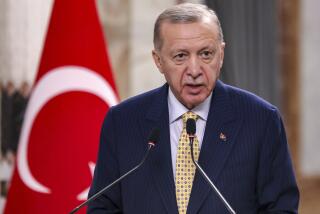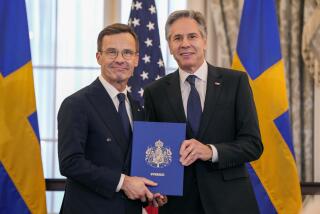Turkey Begins Milestone EU Membership Talks
- Share via
ANKARA, Turkey — After waiting in Europe’s antechamber for 42 years, Turkey early today became the first predominantly Muslim country to open membership talks with the European Union.
The negotiations launched at a gathering of EU foreign ministers in Luxembourg followed a day of frantic diplomacy that nearly foundered on Austrian opposition and differences over the divided Mediterranean island of Cyprus.
“We have taken another giant step in our march toward Europe,” Turkish Prime Minister Recep Tayyip Erdogan said shortly after the deal was announced late Monday. “The journey will be fraught with difficulties, and should Europe abide by its promises ... our success will then largely depend on you, the Turkish people.”
In Luxembourg, British Foreign Secretary Jack Straw, who led what he called “a pretty grueling 30 hours of negotiations,” said the agreement marked a “truly historic day for Europe and the whole of the international community.”
Since 1963, Turkey has been an associate member of the alliance, awaiting full membership.
EU leaders agreed in December to open negotiations with Turkey by Monday, partly in response to sweeping reforms adopted by Erdogan’s government. However, arguments over details of an agreement that would guide those talks had threatened to delay or even scuttle Turkey’s membership bid.
Austria dropped its objections after a tough day of talks among the alliance’s 25 members, who were required to come to a unanimous decision if the membership negotiations with Turkey were to begin. A short time later, EU officials announced that they had agreed to Vienna’s request to open delayed membership talks with Croatia, a historical ally of the Austrians.
Turkey now faces an arduous process in which many aspects of its policies and record on human rights and civil liberties will be held up to scrutiny by an increasingly skeptical Europe. The EU says that the talks cannot end before 2014 and that there is no guarantee they will end in Turkey’s favor.
Backers of Turkey’s membership bid say the country’s youthful population, modern army and strategic importance at the crossroads of Europe, the Middle East and the former Soviet states would inject sorely needed dynamism and muscle into the European bloc.
Straw warned earlier Monday that blocking Turkey’s entry would send a negative signal to the rest of the Muslim world, creating a “theological-political divide, which could open up even further down the boundary between so-called Christian heritage states and those of Islamic heritage.”
But opposition to Turkish membership has been growing across Europe in recent months, fed by fears of mass migration from the large, underdeveloped nation of 70 million.
Austria had been pressing for a so-called privileged partnership for the Turks that would fall short of full membership. Turkey had roundly rejected that proposal.
In addition to Austria’s resistance, differences between the EU and Turkey over alliance member Cyprus threatened to derail Monday’s deal. Turkey refuses to recognize Cyprus, which has been divided since Turkish troops invaded the Turkish-dominated north of the island in 1974 after an abortive coup by Greek Cypriot ultranationalists.
The Turks’ concerns were overcome Monday after the Bush administration assured them that the U.S. would support Turkey’s efforts to keep Cyprus out of NATO until a United Nations-sponsored deal to reunify the island was reached.
Despite the agreement to begin talks with the EU, the mood in Turkey remained somber.
“The Europeans will never allow Turkey to join, and the conditions they are imposing are completely unacceptable,” Ismail Cem, a former foreign minister, told the NTV news channel.
Many Turks are worried about the EU’s emphasis on minority rights, especially as it may apply to the country’s 14 million ethnic Kurds.
“The EU wants to divide Turkey, create an independent Kurdish state,” said Saliha Saka, a homemaker who took part in a rally staged by ultranationalists Sunday in Ankara, the capital. “We will never allow it.”
Yet despite such fears, the majority of Turks still support EU membership, according to polls, if only for the reforms that the membership bid has already brought, such as abolition of the death penalty.
“In the end, the [membership] process is more important than actual membership itself,” said Semih Idiz, a commentator on EU affairs. The irony, he noted, is that the day Turkey becomes “fit to join the EU, it will be fit to survive without it.”
More to Read
Sign up for Essential California
The most important California stories and recommendations in your inbox every morning.
You may occasionally receive promotional content from the Los Angeles Times.










